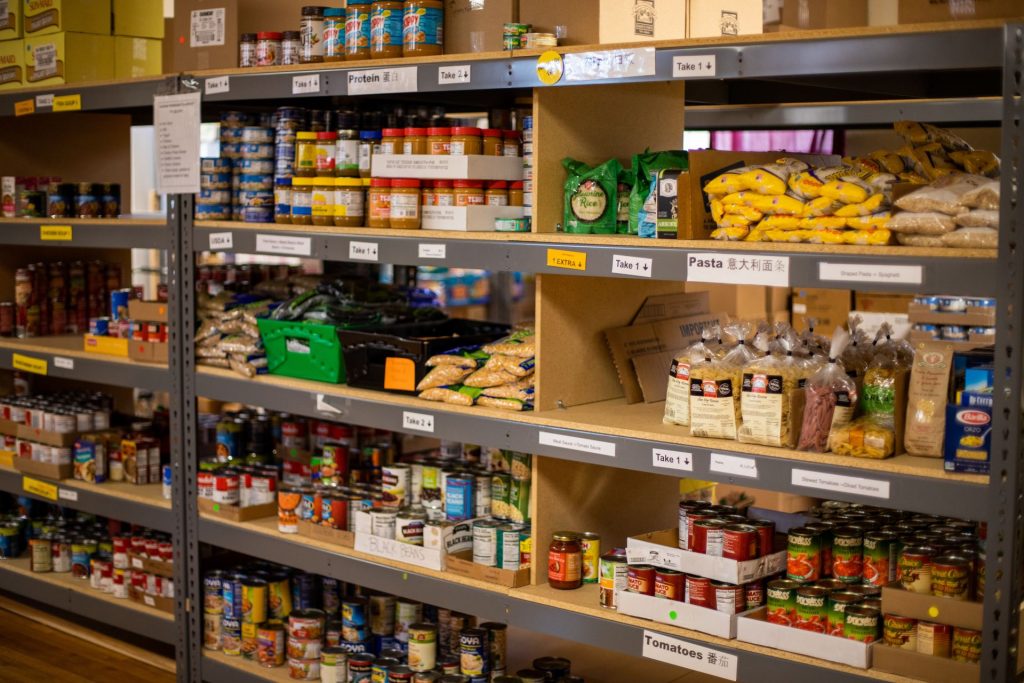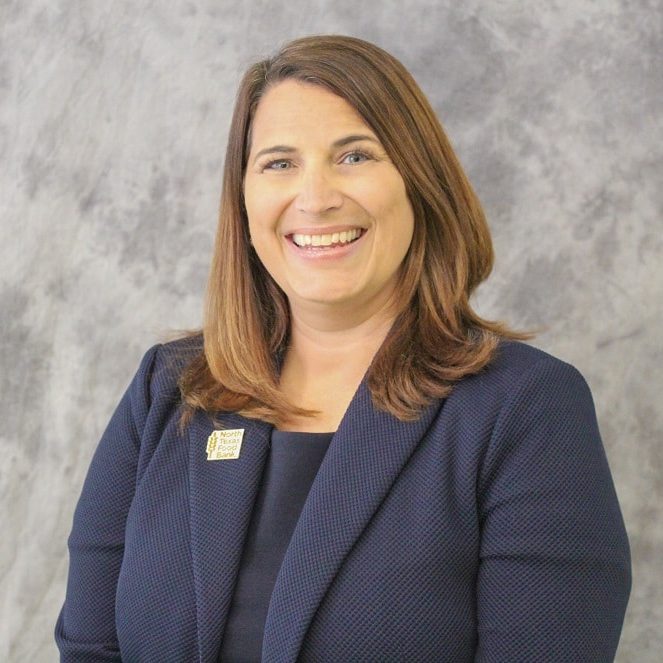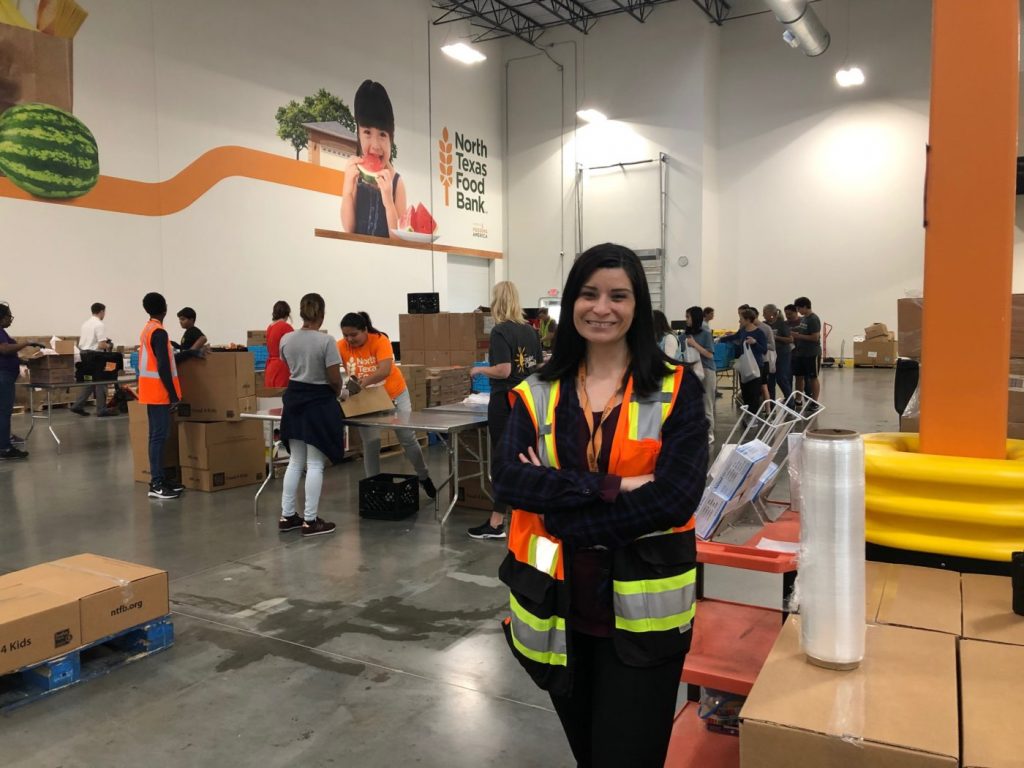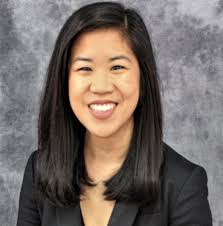Alumnae at North Texas Food Bank are Motivated by the Mission
By: Development Communications | May 12, 2020
Alumni News

For Erica Yaeger MBA’02, Vicky Eaglebear MBA’18 and Diana Kao BS’11, MS’16, working at the North Texas Food Bank was business as usual at the start of the new year. That is, until the threat of the novel coronavirus became a reality.
“We were prepared, we just didn’t expect it to escalate as quickly as it did,” said Yaeger, chief external affairs officer for the food bank.
A continuity plan was put in place around the end of February, but no amount of preparation could account for the demand the North Texas Food Bank would face once schools shut down and people across the Metroplex were suddenly left without jobs.
“The first few weeks — they were emotional, they were exhausting, but that’s because we were working more hours than we were sleeping,” Yaeger said.

Like other businesses across the country, employees of the food bank were forced to step outside of their traditional roles to accommodate the most pressing needs. Fundraisers were packing boxes of food and leading production lines by day, then tending to their regular duties at night.
“When we were first figuring out how we could serve our community, people from all over the food bank had to step out of their normal roles,” said Kao, a major gifts officer for the food bank. “I took a couple of shifts at the warehouse and some of us were trained on how to run production lines. We’ve needed all hands on deck.”
For an organization that has consistently utilized volunteers, the threat of the coronavirus turned its operations upside down when helpful hands were scared to pack boxes. Thanks to a phone call from a board chair, that problem was solved by partnering with Shiftsmart, an app that allows local philanthropists to contribute funds to provide employment for displaced hospitality workers.
“A lot of our volunteers during the week are corporate volunteers, and they were nervous to come in,” Yaeger said. “We ceased regular volunteer operations, and in this case, the worker was being paid by the Communities Foundation of Texas.”
The shift from unpaid to paid volunteers is just one way the food bank and its employees have had to remain flexible in response to COVID-19, which has forced the organization to rethink its traditional way of business.
“We had to be able to creatively shift our model and recognize the need to get the food out the door to our community,” said Eaglebear, the food bank’s director of volunteer operations.

Thanks to Eaglebear and her team, the nonprofit was able to redesign its production line to provide a low- to no-touch distribution model. For the food bank’s produce drops and mobile pantries, this means each box is pre-packaged and can be loaded into someone’s car with less contact. And now that the National Guard has stepped in to run the daily production lines, the food bank can operate in a more safe and efficient way.
“This pandemic has stretched our nation’s food banks in ways we couldn’t anticipate,” Eaglebear said. “Our response to this pandemic exemplifies the heart of the mission of the food bank. Our mission is to close the hunger gap in our community by providing access to nutritious food.”
And that need continues to increase. Just last month, the food bank delivered its largest food donation since the coronavirus hit, with more than 6,500 boxes of food given to 2,230 families, according to The Dallas Morning News.
“I’m grateful that we’ve received so much exposure and the media has told the story of the need and the food bank’s response,” Yaeger said. “I’m hopeful our community is now aware that hunger is a significant issue.”
Thanks to increased awareness, the food bank has also seen an unprecedented response from the North Texas region, from increased donations to daily deliveries of items from their Amazon Wishlist.
“We’ve seen some donors who have already given their annual amount, and they still have found a way to give a little bit more,” Kao said. “It’s been incredible.”

Throughout the pandemic, Yaeger, Kao and Eaglebear have all been able to put the principles they learned at the Naveen Jindal School of Management to use by relying on one certainty: change.
“There are always changes, and one of the things I learned at UTD is that companies that don’t change are the companies that fail,” Kao said. “One of the challenges we face is keeping up with that change. It can be a lot to take on, but it’s the only way.”
As the food bank continues to adapt to the needs of the community, the uncertainty of the future won’t keep its employees from remaining dedicated to the organization’s mission of helping those who need it most.